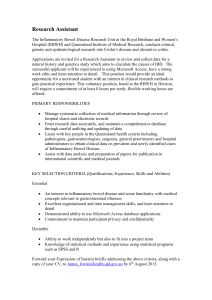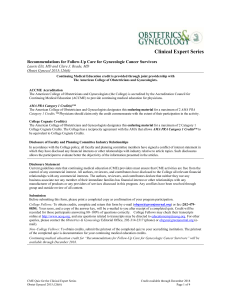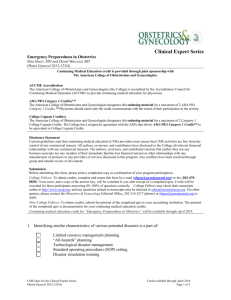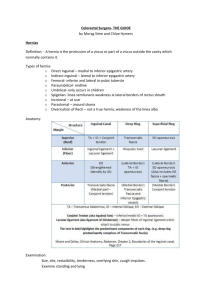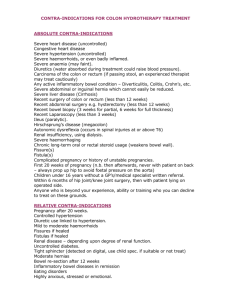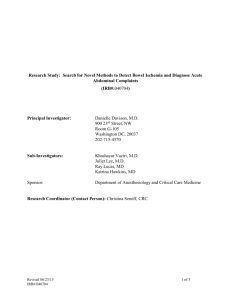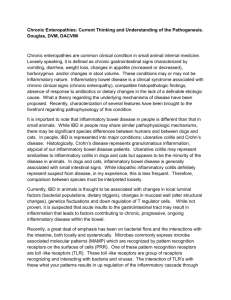Care of the Pregnant Patient With
advertisement
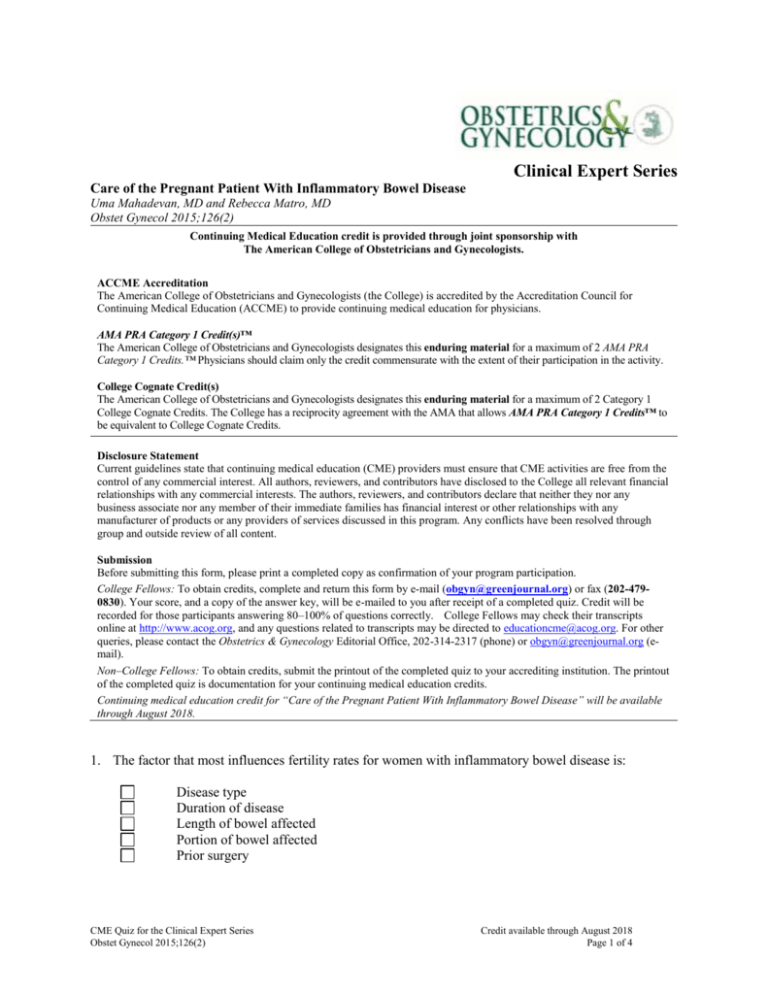
Clinical Expert Series Care of the Pregnant Patient With Inflammatory Bowel Disease Uma Mahadevan, MD and Rebecca Matro, MD Obstet Gynecol 2015;126(2) Continuing Medical Education credit is provided through joint sponsorship with The American College of Obstetricians and Gynecologists. ACCME Accreditation The American College of Obstetricians and Gynecologists (the College) is accredited by the Accreditation Council for Continuing Medical Education (ACCME) to provide continuing medical education for physicians. AMA PRA Category 1 Credit(s)™ The American College of Obstetricians and Gynecologists designates this enduring material for a maximum of 2 AMA PRA Category 1 Credits.™ Physicians should claim only the credit commensurate with the extent of their participation in the activity. College Cognate Credit(s) The American College of Obstetricians and Gynecologists designates this enduring material for a maximum of 2 Category 1 College Cognate Credits. The College has a reciprocity agreement with the AMA that allows AMA PRA Category 1 Credits™ to be equivalent to College Cognate Credits. Disclosure Statement Current guidelines state that continuing medical education (CME) providers must ensure that CME activities are free from the control of any commercial interest. All authors, reviewers, and contributors have disclosed to the College all relevant financial relationships with any commercial interests. The authors, reviewers, and contributors declare that neither they nor any business associate nor any member of their immediate families has financial interest or other relationships with any manufacturer of products or any providers of services discussed in this program. Any conflicts have been resolved through group and outside review of all content. Submission Before submitting this form, please print a completed copy as confirmation of your program participation. College Fellows: To obtain credits, complete and return this form by e-mail (obgyn@greenjournal.org) or fax (202-4790830). Your score, and a copy of the answer key, will be e-mailed to you after receipt of a completed quiz. Credit will be recorded for those participants answering 80–100% of questions correctly. College Fellows may check their transcripts online at http://www.acog.org, and any questions related to transcripts may be directed to educationcme@acog.org. For other queries, please contact the Obstetrics & Gynecology Editorial Office, 202-314-2317 (phone) or obgyn@greenjournal.org (email). Non–College Fellows: To obtain credits, submit the printout of the completed quiz to your accrediting institution. The printout of the completed quiz is documentation for your continuing medical education credits. Continuing medical education credit for “Care of the Pregnant Patient With Inflammatory Bowel Disease” will be available through August 2018. 1. The factor that most influences fertility rates for women with inflammatory bowel disease is: Disease type Duration of disease Length of bowel affected Portion of bowel affected Prior surgery CME Quiz for the Clinical Expert Series Obstet Gynecol 2015;126(2) Credit available through August 2018 Page 1 of 4 2. The lower rate of childbearing among women with inflammatory bowel disease compared to other women is primarily due to: Heritability of the disease Physician recommendation Reduced fertility Safety of medications during pregnancy Voluntary childlessness 3. A patient has had inflammatory bowel disease for 8 years. She has no family history of primary sclerosing cholangitis or colon cancer. The most appropriate cancer screening strategy for this patient is: Computerized tomographic virtual colonoscopy Colonoscopy with chromoendoscopy Double contrast barium enema Fecal occult blood testing Flexible sigmoidoscopy 4. An inflammatory bowel disease flare may be suggested by an extreme increase in: Creatinine clearance Sedimentation rate Serum folic acid Serum iron Vitamin D level 5. Ideally, women with inflammatory bowel disease should attempt conception when they: Are having 3 or fewer diarrheal stools per day Can be weaned off all medications for the duration of the pregnancy Have been in remission for at least 6 months Have been in remission for at least 12 months Have completed any planned surgical therapies for their bowel disease 6. The greatest risk of inflammatory bowel disease flare in the peripartum period occurs when women: Attempt to breastfeed Discontinue medications Enter the second trimester Receive labor augmentation with prostaglandins Undergo vaginal delivery CME Quiz for the Clinical Expert Series Obstet Gynecol 2015;126(2) Credit available through August 2018 Page 2 of 4 7. Pregnant women with a history of inflammatory bowel disease who experience diarrhea should be tested for: Colonic stricture Clostridium difficile Escherichia coli Occult blood Pseudomonas infection 8. Which of the following medications used to treat inflammatory bowel disease is contraindicated during pregnancy or breastfeeding? Amoxicillin-Clavulanic acid Ciprofloxacin Infliximab Methotrexate Prednisone 9. In the Pregnancy in Inflammatory Bowel Disease and Neonatal Outcomes registry, after controlling for disease activity and concurrent immunosuppressive medications, maternal corticosteroid use was associated with a significant increase in: Cesarean delivery Infant infections within the first 4 months of life Low birth weight Omphalocele Preeclampsia 10. In utero anti-TNF drug exposure late in pregnancy has raised concerns regarding: Development of the infant immune system Infantile asthma Infantile breast milk metabolism Infantile irritable bowel syndrome Neonatal necrotizing enterocolitis CME Quiz for the Clinical Expert Series Obstet Gynecol 2015;126(2) Credit available through August 2018 Page 3 of 4 College ID Number: Name: Address: City/State/Zip: E-mail Address: Actual time spent completing this activity (you may record up to 2 hours): CME Quiz for the Clinical Expert Series Obstet Gynecol 2015;126(2) Credit available through August 2018 Page 4 of 4
